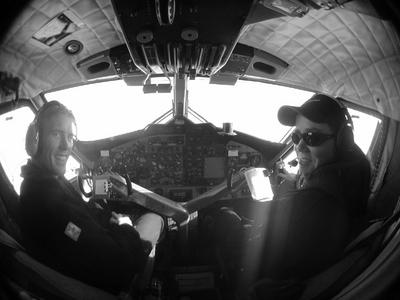
|
|
9 January, 2003
Record setting meteorite hunting (Posting by Andy Caldwell and Jamie Pierce)
This morning was the ideal sort of morning in Antarctica. The wind was
calm, the skies clear, and Jamie had good news for us. Jamie let us know
that it may be possible for us to get pulled out two days early, on
Monday. He found out from McMurdo that we are not catching planes on their
way back from the pole, but rather, two flights have been allocated just to
get us out from the field. This means that we will do our traverse on
Saturday, get everything palletted on Sunday, and be ready to go on
Monday. We can do this because we know we have covered all the areas that
we set out to search, and more. This will give us a couple of extra days
at McMurdo to get our final chores done. Of course this is all weather
dependent and may mean there could be some difficulty with web postings in
that we won't have any power to recharge the phone or computers.
Under ideal conditions, we set off for the Mouthy Ice. We went in hoping
to find at least 40 meteorites so that we could break the 500 meteorite
barrier for this season. On our best day to date, we found 46, so we would
really be pushing our luck. But we got off to a good start, and although
the skies become overcast and the air cooled, we were still around 30
meteorites by lunchtime.
Then it exploded! Instead of finding one in a spot, we would find
five. All three meteorite collection kits were in constant use. Two ran
out of the freezer tape we use to seal the bags that contain the
meteorites. Most were small (~1cmx1cmx1cm), but Scott gets the award for
finding the largest. It must have weighed over 10 lbs! He also gets the
award for the smallest. It's easy to get picky and pass up the small ones,
but you never know what treasures they hold. About 1:00PM, I found the
500th meteorite, but it would not be the last.
Given that this group is made of meteorite experts and that we've seen over
500 meteorites here, we can say with certainty that some of the meteorites
we collected today were not ordinary chondrites. Generally, ordinary
chondrites make up about 80% of witnessed falls and probably a little more
of what we collect. Nevertheless, there were several meteorites today that
we all knew were a little out of the ordinary.
Thinking that today would be our last day to search, we worked for 10
hours, with a short break for lunch. The wind got colder, but more and
more meteorites kept turning up. By 7:00PM, we had found 113 meteorites,
more than doubling our previous record. Even though we could see more
meteorites, we decided we would dedicate the first half of tomorrow to
finishing the Mouthy Ice. This group has the kind of work ethic not to
leave MacAlpine with any uncovered ground. We are at 573 for the season,
and Dante is leading the chant, "600." I'm so sore tonight from
maneuvering the ski-doo and crouching down on the ice to collect each one,
that I'll be happy no matter how many we recover tomorrow.
Tomorrow, we have three main areas to focus. The morning will be dedicated
to finishing the Mouthy Ice. The afternoon will be dedicated to packing up
any remaining gear for Saturday's traverse including the Sensorweb pods and
the solar panels. We are also expecting a plane tomorrow with mail, and
more importantly, spare snowmobile parts that we might need on the
traverse. Jamie has worked extensively with the pilots here in Antarctica
and would like to say a few words.
I'd like to just acknowledge our pilots and flight engineers that put forth
great effort every season, and more importantly express my many
thanks. Our pilots don't just fly the planes...they load, and unload
barrels of fuel, transport 750 lb ski-doos, and more importantly bring us
mail, not to mention just a new face too look at every few weeks. None of
this would be possible without the hard work and dedication too all these
pilots, Mark and Erin in parcticular, since they've brought us everything
from toilet paper too Christmas presents, it really is back breaking
work. These pilots fly every season from Calgary, Alberta all the way too
Antarctica via South America, and eventually onto the Peninsula, making
this immense voyage spanned over many days. In all I believe this season
we have 6-7 Twin Otters supporting various science projects around the
continent. Thanks again....

Mark and Erin of Kenn Borek Aviation on KBH, somewhere over Beardmore Glacier, (photo Jamie Pierce).
Contact the TEA in the field at
.
If you cannot connect through your browser, copy the
TEA's e-mail address in the "To:" line of
your favorite e-mail package.
|
